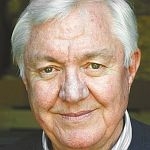( Host) The war news from Afghanistan was not good this past week –
Host) The war news from Afghanistan was not good this past week –
although diplomatic talks with Iran over its nuclear program after a
long hiatus show some promise. Commentator and retired ABC News
diplomatic correspondent Barrie Dunsmore brings us up to date.
(Dunsmore)
The Taliban attack on Afghanistan’s parliament and the diplomatic area
of Kabul reminded me a little bit of the 1968 Tet offensive when the
communists shocked America by attacking hundreds of towns and cities
including the South Vietnamese capital Saigon. Either in the size of the
attacks or the casualties – there is absolutely no comparison. What is
similar is that as with the communists this new assault by the Taliban
was to send a political message. In its simultaneous attacks in four
parts of the country including Kabul, the Taliban was seeking to
undermine civilian confidence in NATO and the Afghan military – by
disrupting normal life and terrifying residents for more than fourteen
hours.
There have also been more embarrassing photos of American
soldiers posing with suicide bomber body parts – not so long after the
killings that followed the burning of copies of the Koran by US troops –
and the massacre of 16 Afghan civilians including 9 children by an
American soldier. Recent opinion polls reflect this spate of bad news.
Earlier this month more than two thirds of Americans – 69 percent –
thought that the United States should no longer be at war in
Afghanistan. Key NATO countries are planning draw-downs. I would not
expect any major American withdrawals to occur this year but an
accelerated withdrawal next year down to about 20,000 seems likely.
After the decade of war since 9/11, the American people are showing the
signs of battle fatigue.
And yet, almost under
the radar with virtually no national debate, President Barack Obama and
the Pentagon, are struggling to avoid being dragged into still another
war, this time with Iran. Such a war has the potential to be far worse
than anything we have seen in Iraq and Afghanistan. However, it is not
inevitable.
Washington Post columnist David Ignatius is highly
respected for his Middle East experience and excellent contacts in
intelligence circles. This week he published a remarkably upbeat column
about chances for success for the new diplomatic talks between Iran and
the five permanent members of the UN Security Council, plus Germany,
over Iran’s nuclear program. The Iranians are under great pressure from
new draconian economic sanctions that could totally cripple their
economy – and from continuing Israeli threats to bomb their nuclear
facilities. Ignatius offers persuasive analysis that as these new talks
proceed, Iran will eventually agree to the key demand that it
cease reprocessing uranium to potentially weapon’s grade levels – and in
return, sanctions will slowly be eased as Iran opens up to UN weapons
inspectors.
Either Iran or Israel may still choose the war
option. But there are now signs that another, even more devastating
Middle East war can be avoided – if creative diplomacy is given a
reasonable chance to succeed.